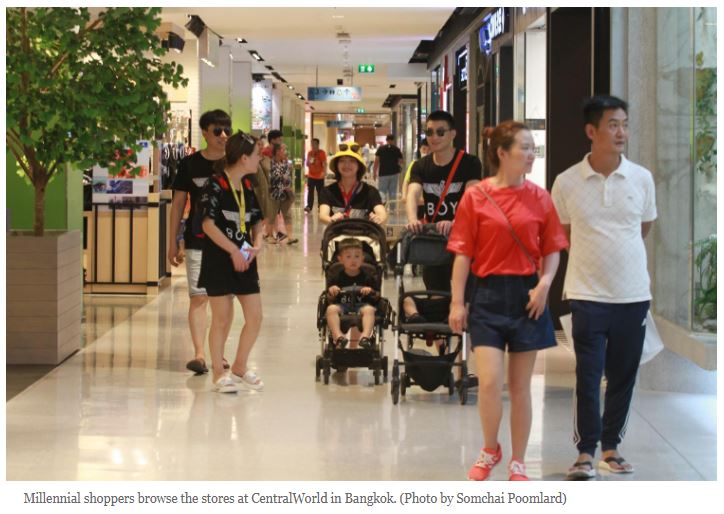Thailand: Millennials mired in shopping debts
Thai millennials’ spending on ‘must-have items’ amounts to 1.37 trillion baht a year, representing 13% of the country’s GDP, and half of them owe debts, while one-fifth of debtors have defaulted, according to TMB Analytics.
Gen Y, those born in 1981-96, total 14.4 million people in Thailand and 7.2 million of them are indebted, said Naris Sathapholdeja, head of TMB Analytics. Some 1.4 million out of 7.2 million millennial debtors have defaulted.
“Some 1.4 million people in this age group are debtors, while their soured loans comprise 7% of total non-performing loans [NPLs]. According to the Bank of Thailand data, 7.2 million millennials shoulder debts amounting to 423,000 baht each on average,” he said.
“Noticeably, 20% of Gen Y debtors or 1.4 million people failed to repay debts, accounting for 7.1% of total NPLs.”
The average Gen Y consumer spends almost 100,000 baht a year, or one-fourth of their annual income, to buy “must-have” items including mobile phones, cosmetics, handbags, clothing, and watches and accessories, said Mr Naris.
Annual spending on must-have items totals 1.37 trillion baht a year, or 91% of the five-year investment budget of the Eastern Economic Corridor project and eight times the high-speed rail to link the three airports.
High pay for millennials and nonchalant borrowing behaviour contributes to their lavish spending, he said.
The findings come from a survey on social media about Gen Y’s financial behaviour through the campaign#musthaveitemsbefore40.
Mr Naris said 42% of the respondents say they have bought must-have items out of fear they will be behind trends.
Interestingly, 70% of the respondents said they have borrowed money from financial institutions or cash advance cards to purchase such must-have items, he said.
More than 70% of Gen Y use instalment payment services that charge an interest rate.
The percentage of Gen Y respondents whose spending on must-have items exceeds their allocation to savings is 47% or 6.8 million people, a level that is significant enough to warrant attention, said Mr Naris.
The survey’s findings underscored the central bank’s recent move to tighten credit cards and personal loans for those with income below 30,000 baht a month after tracking millennials’ financial behaviour.
Some 48% of Gen Y respondents dream of having their own homes, while 22% want their own cars. But they spend up to 69% of their income on must-have items and only 12% for homes, 10% for cars and 9% for savings and other assets, according to the survey.
According to a breakdown on spending for must-have items, 22% is for mobile phones, 11% clothing, 8% cosmetics, 5% electronic devices, 4% handbags, and 2% for watches and ornaments.
Mr Naris said the findings indicated these young consumers need to be educated about savings.
Based on the median savings for the average Gen Y respondent of 5,500 baht a month, it would take 90 years to save 6 million baht to support their needs in retirement.
Source: https://www.bangkokpost.com/business/1802209/millennials-mired-in-shopping-debts


 Thailand
Thailand





